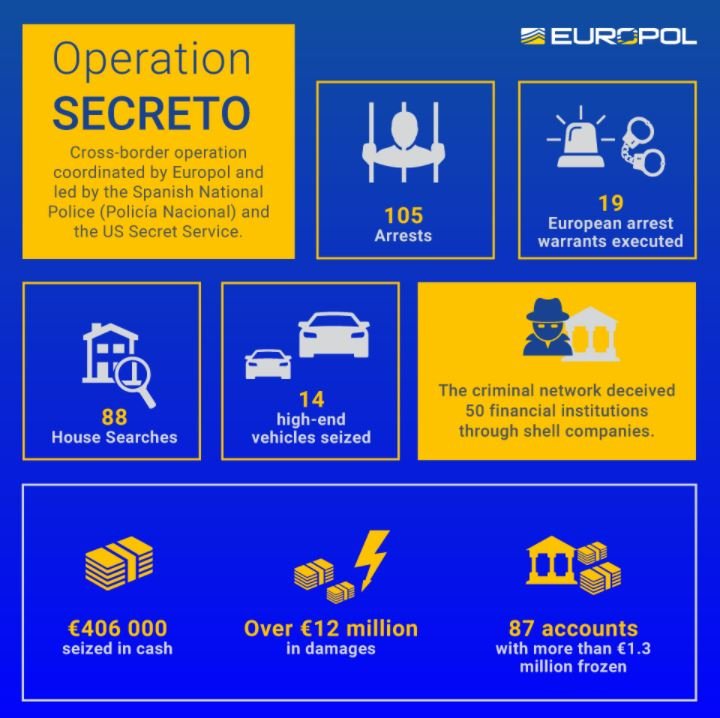Thanks to the collaboration of Europol, the Spanish National Police and the U.S. Secret Service, a cybercriminal group responsible for bank fraud and money laundering was dismantled. This operation was also attended by the authorities in Austria, Denmark, Greece and the U.S. Department of Justice (DOJ).
Europol is an international agency working together with the member states of the European Union to combat terrorism, organized crime, cybercrime, among other tasks.
In a multiple raid on 6 October 2020, the authorities made a total of 37 arrests in more than 40 different locations, seizing 13 luxury cars. The authorities also froze 87 bank accounts equivalent to more than $1.5 million USD. By the end of the operation, 122 individuals had been arrested and more than $500,000 USD worth of cash was seized.

Europol reports mention that most members of this criminal group are Greek citizens, who were engaged in the establishment of phantom companies in the U.S. The defendants created bank accounts for these companies, making transfers between accounts in the U.S. and the European Union, giving the impression of trading legitimately.
Since no suspicious activity associated with these companies was detected in the first instance, American banks issued multiple credit and debit cards for their accounts. Subsequently, a group of retailers based in Spain that was part of the fraudulent scheme used multiple cards to finance the amounts recorded by fraudulent companies. Finally, criminals laundered these funds by transferring them to different bank accounts throughout Europe.
The DOJ estimates that more than 50 financial companies in the U.S. were victims of this fraudulent scheme, losing more than $12 million USD.
Europol facilitated access to information for all law enforcement agencies involved in the case, as well as providing support in areas of analysis and intelligence during the eight months of the operation. To this end, the international agency enabled a focal point in its transfer in the Netherlands, allowing foreign agents to work properly. Europol also sent an analyst to Greece to provide real-time analytical support to local researchers.
The agency mentions that its Joint Cybercrime Action Task Group (J-CAT) also played a key role in the success of the operation. It should be mentioned that this team is composed of cybersecurity specialists dedicated to investigating the most complex cybercrime cases.
For more information on vulnerabilities, exploits, malware variants, cybersecurity risks and information security courses, feel free to access the International Cyber Security Institute (IICS) website.

He is a well-known expert in mobile security and malware analysis. He studied Computer Science at NYU and started working as a cyber security analyst in 2003. He is actively working as an anti-malware expert. He also worked for security companies like Kaspersky Lab. His everyday job includes researching about new malware and cyber security incidents. Also he has deep level of knowledge in mobile security and mobile vulnerabilities.











